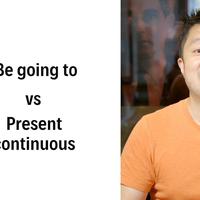Be going to vs Present continuous - English In A Minute - YouTube
Будь||||||||||
être||||||||||
Be|going|to|versus|present tense|present continuous|future plans|inside|future plans|minute|video platform
|||oder|||||||
Be going to vs Present Continuous – Englisch in einer Minute – YouTube
Be going to vs Presente continuo - English In A Minute - YouTube
Be going to vs Present continuous - English In A Minute - YouTube
Be going to vs Present continuous - Inglese in un minuto - YouTube
Be going to vs 現在進行形 - English In A Minute - YouTube
연속적으로 가기와 현재하기 - 1분 안에 영어 - YouTube
Be going to vs Present continuous - Angielski w Minutę - YouTube
Be going to vs Present continuous - Inglês Num Minuto - YouTube
Be going to vs Present continuous - English In A Minute - YouTube
Be going to vs Present continuous - English In A Minute - YouTube
Be going to vs Present continuous - English In A Minute - YouTube
Be go to 与 Present 连续式 - 一分钟英语 - YouTube
Be go to 與 Present 連續式 - 一分鍾英語 - YouTube
Hi! This is Kee from BBC Learning English,
|||Kee||British Broadcasting Corporation|education|
Hi! Hier ist Kee von BBC Learning English,
and today I'm going to tell you the differences
||||||||skirtumus
||||||||distinctions
und heute werde ich Ihnen die Unterschiede erzählen
between 'be going to' and the present continuous
|||||||continuous
zwischen 'be going to' und dem Present Continuous
'~에'와 현재 계속사 사이
to talk about future plans.
um über Zukunftspläne zu sprechen.
We use 'be going to' to talk about future plans.
Wir verwenden „be going to“, um über Zukunftspläne zu sprechen.
The plan will probably take place,
|||greičiausiai||
||||відбудеться|відбудеться
Der Plan wird wahrscheinlich stattfinden,
계획은 아마도 실행될 것입니다,
but it's not a definite plan.
||||определённый|
||||certain|
||||definido|
||||sicheres|
||||apibrėžtas|
||||точний|
aber es ist kein konkreter Plan.
If I say:
Wenn ich sage:
I'm going to meet my friends this weekend,
|||se setkat||||
Ich werde dieses Wochenende meine Freunde treffen,
it means I made plans with my friends,
es bedeutet, dass ich Pläne mit meinen Freunden gemacht habe,
but it could mean that we haven't decided where to
|||||||nusprendėme||
||könnte|bedeuten|||nicht|||
|||||||вирішили|куди|
aber es könnte bedeuten, dass wir uns noch nicht entschieden haben, wohin
meet, nor have we decided what time to meet.
|ні|||||||зустрітися
treffen, noch haben wir entschieden, wann wir uns treffen.
On the other hand, we use the present continuous
|||сторона|||||
Andererseits verwenden wir das Present Continuous
On the other hand, we use the present continuous
Por outro lado, usamos o presente contínuo
to talk about future plans that are almost definite.
||||||||certain
||||||||майже певні
um über Zukunftspläne zu sprechen, die fast definitiv sind.
というように、ほぼ確定している将来の計画について話すことです。
If I say:
Wenn ich sage:
I'm meeting my friends this weekend,
Ich treffe mich dieses Wochenende mit meinen Freunden,
I'm meeting my friends this weekend,
it means I made plans with my friends,
es bedeutet, dass ich Pläne mit meinen Freunden gemacht habe,
and we may have decided where to meet
||vielleicht|||||
und wir haben vielleicht entschieden, wo wir uns treffen
and what time to meet.
und wann wir uns treffen.
So, this plan is almost definite and it's difficult to cancel.
||||||||||zrušit
||||||||||stornieren
Dieser Plan ist also fast definitiv und es ist schwierig, ihn zu stornieren.
So remember,
|пам'ятай
Also denk daran,
So remember,
the present continuous describes a more definite plan
|||apibūdina||||
|||beschreibt||||
|||описує||||
das Present Continuous beschreibt einen genaueren Plan
現在進行形
than 'be going to'.
als||gehen|
als "werden".
be going to'よりも。

